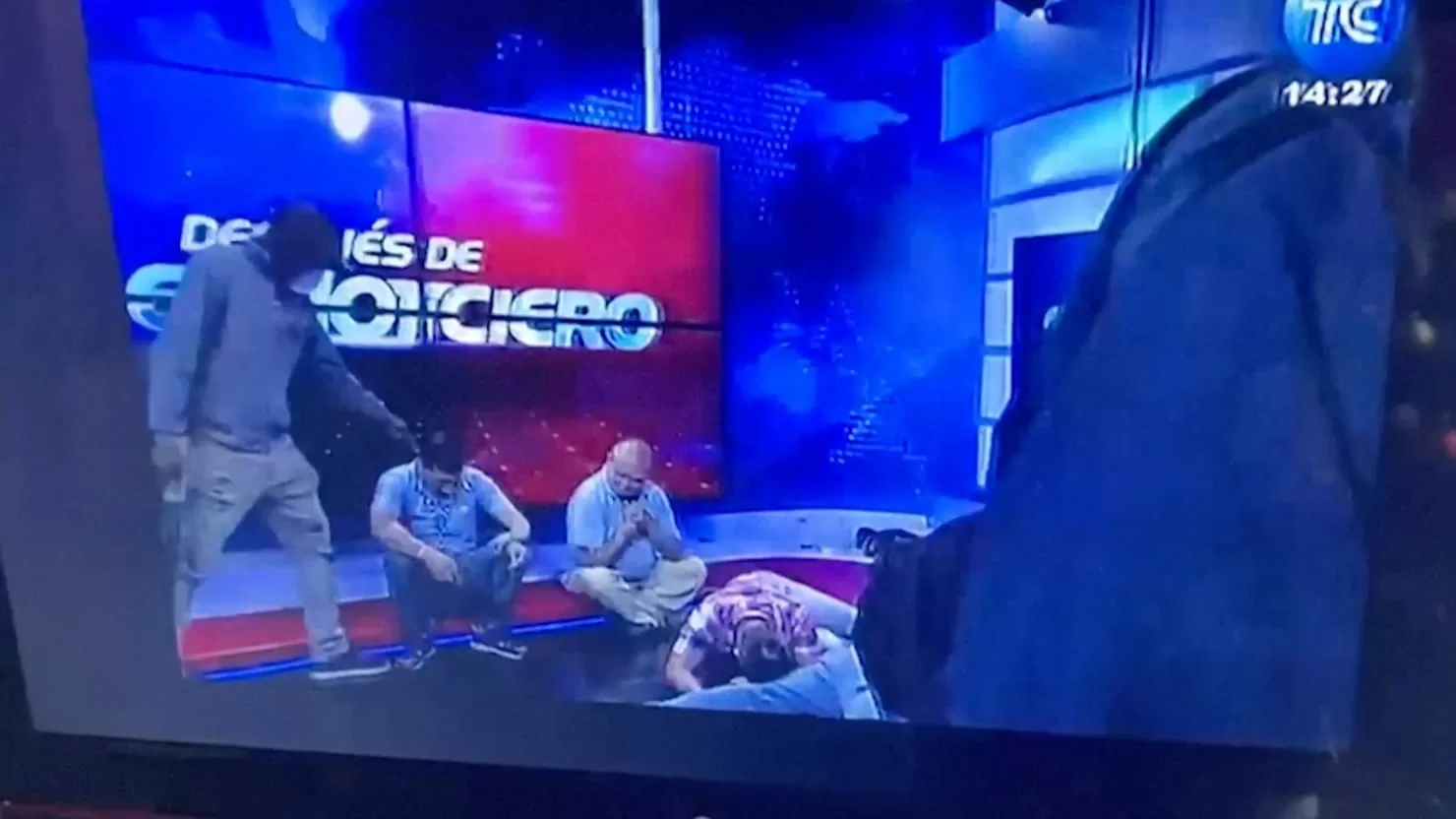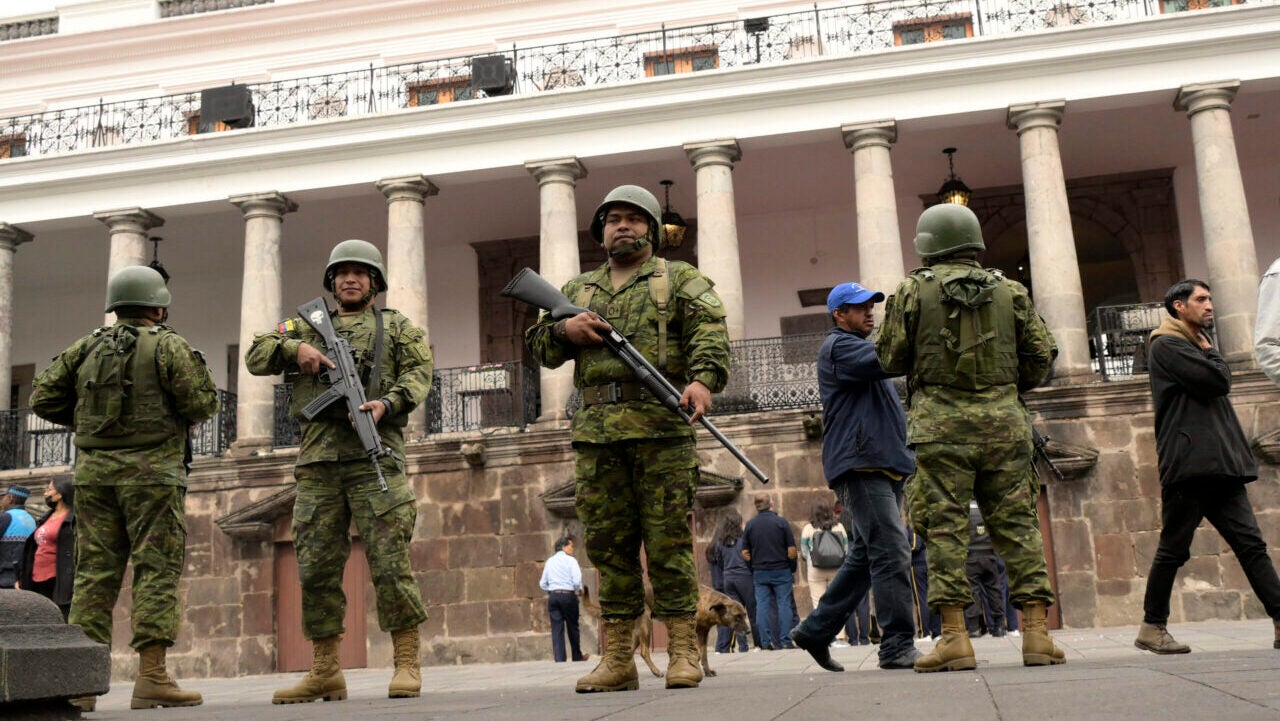
Daniel Noboa, the president of Ecuador, has proclaimed an “internal armed conflict” and given security forces orders to “neutralize” several criminal organizations that are allegedly responsible for inciting excessive violence throughout the South American country.
The proclamation was issued soon after armed and hooded individuals disrupted a live television program. On Tuesday, many violent occurrences were occurring all around the nation.
Ecuadorians watched in disbelief when the coastal city of Guayaquil took over TC Television’s live broadcast. Social media footage showed the attackers pushing state-owned network employees into the studio floor while gunfire and shouting could be heard in the background.
Later, the Ecuadorian police said that all of the armed individuals had been taken into custody, the media outlet’s personnel had been evacuated, and all of the hostages were still alive.
According to César Zapata, General Commander of the National Police, 13 persons were detained and at least four guns, two grenades, and “explosive material” were found. He further stated that the offenders will face consequences for their “acts of terrorism.”
Jorge Rendon, anchor for TC Television, called the seizure of the show a “very violent attack.”
In a video posted to TC Television’s official X account, Rendon recollected, “They wanted to enter the studio so that we could say what they wanted, I guess their message.” According to Rendon, he was aware of one person being shot and another being hurt by the attackers. The injuries have not been verified by the police.
Many Ecuadorians are afraid of this circumstance. A woman who lives outside of Guayaquil and was instructed by her work to leave early spoke of the tumultuous traffic on her way home. “Everyone was just trying to get through; cars were going the wrong way,” she continued.
“Observing the desperation—businesses closing, people running frantically in roads meant for cars, including women and children—was the most terrifying aspect.”
After prominent gang boss Adolfo “Fito” Macias escaped from a jail in Guayaquil on Monday, Noboa proclaimed a countrywide state of emergency. Since then, the nation has been shaken by explosions, police kidnappings, and prison unrest.
Tuesday saw eight fatalities in Guayaquil, according to the local police. In the neighboring city of Nobol, two police officers were also slain, according to National Police on X.
In the meantime, the National Police reported Tuesday night that ten persons had been detained following the release of three abducted police officers in the southwest city of Machala. Before the declaration of a state of emergency, authorities said that at least seven cops had been kidnapped in three different locations.
Nationwide, the National Police said early on Wednesday that some 70 persons had been detained and 17 more had been taken back. In many raids, the police claimed to have captured eight explosive devices, fifteen Molotov cocktails, nine weapons, thirty-eight firearm cartridges, six motorbikes, and six automobiles.
In a video posted on X on Tuesday, former president Rafael Correa claimed that Ecuador is “living a real nightmare.” He stated that “the errors of hatred accumulated over the last seven years, and the systematic destruction of the rule of law” were to blame for the current state of affairs.
For the duration of the 60-day state of emergency, the military troops and police will be called upon to quell disruptions to public order.
There is a curfew in place, which runs from 11 p.m. to 5 a.m., to prevent gatherings and activities that can endanger public order. With mixed results, Noboa’s troubled predecessor, former President Guillermo Lasso, declared many declarations of emergency.
Noboa’s proclamation, which was issued on Tuesday, stated that there was an “internal armed conflict” in the nation and gave the military orders to “neutralize” armed organizations that had been designated as terrorists.
The commander of Ecuador’s military forces, Adm. Jaime Vela Erazo, promised on Tuesday that his organization will not “back down or negotiate” with armed groups, stating that “the future of our country is at stake.”
He declared, “As of right now, every terrorist organization mentioned in the aforementioned [emergency] decree has turned into a military target.”
The new president, who won the run-off election last year on pledges to address rising crime, is facing his most severe test yet in the form of spiraling violence.
Rival criminal organizations have been waging bloody and frequently visible battles for control over drug trafficking routes in Ecuador’s streets and jails, which is partly to blame for the country’s deteriorating security conditions.
An explosive device had been “placed and detonated” in a car the policemen were traveling in during one of this week’s kidnappings, in which three agents were taken hostage, according to police.
Two cars caught fire in the northwest city of Esmeraldas, with one of them starting a fire at a petrol station.
Speaking out against allegations that several medical staff members had been abducted, a hospital in Guayaquil claimed that security officers had prevented armed people from accessing the building. The facility is currently under military security, it added.
Additionally, authorities in Quito, the capital, discovered evidence of gas cylinders inside a burned-out car. On social media, locals claimed to have heard a huge explosion nearby.
In addition, police reported that they responded to “over 20 emergencies during (Monday) evening and overnight (Tuesday) in different parts of the country” after receiving reports of an explosion at a pedestrian bridge outside of Quito. There were no reported injuries from the blasts at the time.
Several nations in the area, notably Peru and Colombia, who are neighbors of Ecuador, voiced worry over the disturbance there and offered assistance for Noboa’s administration to bring about peace.
Peru is to declare an emergency along its whole northern border with Ecuador, according to officials there. Additionally, the National Police have been instructed by Peru’s interior minister to bolster border security, the government stated.

A US State Department official stated in a statement on X that the US is “ready to assist the Ecuadorian government” and that the US stands with the people of Ecuador.
At least six events, involving disruptions and the detaining of prison officers, occurred within Ecuadorian prisons on Monday, according to the country’s correctional administration, the SNAI. It stated that conditions within jails were out of control.
Riobamba’s mayor, John Vinueza, reports that Fabricio Colon Pico, another suspected gang boss, broke out of a jail in the city’s center.
Last Friday, Colon Pico was apprehended following Attorney General Diana Salazar’s public disclosure that he was involved in an assault plot against her. Colon Pico was one of 38 prisoners who fled; 12 of them have already been apprehended again, the SNAI informed CNN.
The Armed Forces of Ecuador said that they conducted control operations in the regions most affected by violence on Monday night and early Tuesday.
To “generate concrete actions in the face of the national commotion and multiple acts that threaten public peace,” the Ecuadorian National Assembly is calling an emergency meeting.
More than 3,000 law enforcement officials and personnel of the military forces have been dispatched to look for Adolfo Macias, better known by his pseudonym “Fito,” as the government said on Sunday. Authorities in Ecuador stated that they are still unsure of the precise day and hour when Macias broke out of jail.
The Insight Crime research center claims that Macías is the boss of Los Choneros, one of the most dangerous gangs in Ecuador. Los Choneros has been connected to cocaine trafficking by sea to both Mexico and the United States, collaborating with the Oliver Sinisterra Front in Colombia and the Sinaloa cartel in Mexico.
After being found guilty of narcotics trafficking, he was sent to jail. Before his murder, the late Fernando Villavicencio, a candidate for president of Ecuador, said in July that Macías had threatened him and advised against carrying out his anti-gang campaign for the leadership.
